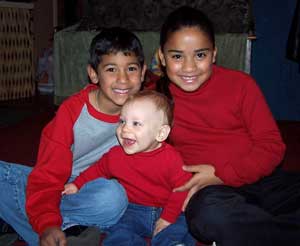News:Why positive reinforcement works..
|
I t is known that children’s behavior is influenced by their overall
development, their environment, and their caregivers. Each child
differs in terms of his/her activity level, distractibility, and
sensitivity. Children must learn to develop socially acceptable and
appropriate behavior as they grow to maturity.
t is known that children’s behavior is influenced by their overall
development, their environment, and their caregivers. Each child
differs in terms of his/her activity level, distractibility, and
sensitivity. Children must learn to develop socially acceptable and
appropriate behavior as they grow to maturity.
This policy is the guideline that Martinez Tender Lovin’ Family Daycare will follow to assist children in developing self-control, self-confidence, and sensitivity in their interactions with others. Guidance is required to ensure order, prevent injury, and ensure a child’s activities are not infringing on the rights of others. It is important that the caregiver ‘sets the stage’ for a positive atmosphere and maximum opportunities for desirable behavior.
You might ask, "How will you accomplish this?" The answer to this question is a very important one. Not only does it tell you as a parent how your child's behavior will be guided, shaped, and corrected; it will give you peace knowing that not only is your child's behavior being guided but that of all the children. So many times you hear stories by parents of children who are on the receiving end of inappropriate behavior by other children and are very unhappy with the way it was handled.
My theory on disciplining in daycare is simple. Positive reinforcement keeps problems at a minimum. Some techniques I use include:
Reinforcing appropriate behavior. I make it a point to watch for, praise and reward good behaviors in order to enforce them. This in and of itself circumvents many problems. Children will mirror behaviors and want approval.
Supervise and observe children in order to anticipate potential difficulties.
Being consistent is EXTREMELY important
Explaining to the children what behavior will be acceptable and explaining the reason for the limits, doing so in a positive way and on their level.
Focusing on the child’s behavior, rather than on the child.
Allowing the children time to respond to the expectations.
Being willing to listen and respond in a fair and supportive manner.
Intervention Strategies
One or more of the following strategies will be used to help create a positive climate and minimize problems in a supportive, rather than punitive way.
By establishing eye contact and calling the child’s name in a calm controlled voice to gain a child’s attention.
By remaining near the child in situations where he/she may be losing self-control.
Children will be reminded of limits taking their feelings into consideration.
For younger children or children with limited attention span and verbal abilities, we will attempt to change the behavior by distracting or diverting the child.
Verbal and/or physical assistance will be shown by modeling problem solving, if a child is discouraged or frustrated.
Children will be offered choices in a non-threatening and non-punitive way to assist them in meeting expectations or to reinforce limits.
If the child is unable to resolve a problem or take responsibility for their actions, they will be re-directed to another activity, or in special circumstances, be limited in the use of a piece of equipment.
If all else fails, the child will be removed from the situation in a way that ensures that the 'time out' is a positive learning experience:
Prior to the use of ‘time out’ the child will be given an explanation of what it means and what it involves.
The ‘time out’ place will be located within the play area, where they can still be supervised, but far enough from the activity.
The child will be in time out for one minute per year old.
If at that time the child is still upset, they will sit out of the current activity until they are ready to participate.
Appropriate or acceptable behavior of the child following ‘time out’ will receive praise.
On a rare occasion where a child loses control and could possibly injure him or herself or others. We may be required to separate the child from the group for an extended period or until he/she is no longer a danger. Parents will always be included in all behavior strategies. I will seek advice and/or ideas in regards to certain pattern behavior problems so that we can work as a team to resolve them. When a child is ready, they will be provided an opportunity to make amends.